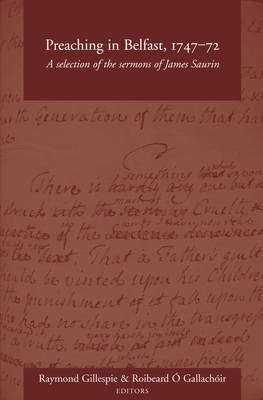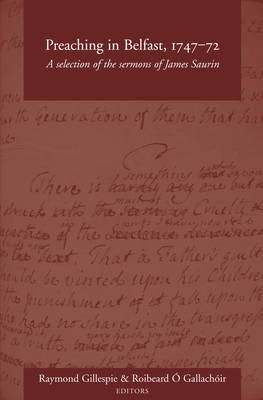
Bedankt voor het vertrouwen het afgelopen jaar! Om jou te bedanken bieden we GRATIS verzending (in België) aan op alles gedurende de hele maand januari.
- Afhalen na 1 uur in een winkel met voorraad
- In januari gratis thuislevering in België
- Ruim aanbod met 7 miljoen producten
Bedankt voor het vertrouwen het afgelopen jaar! Om jou te bedanken bieden we GRATIS verzending (in België) aan op alles gedurende de hele maand januari.
- Afhalen na 1 uur in een winkel met voorraad
- In januari gratis thuislevering in België
- Ruim aanbod met 7 miljoen producten
Zoeken
Preaching in Belfast, 1747-72
A Selection of the Sermons of James Saurin
Raymond Gillespie, Roibeard O. Gallachoir
Hardcover | Engels
€ 69,95
+ 139 punten
Omschrijving
In 1747, James Saurin, a descendant of a prominent Huguenot family, was appointed as vicar of Belfast. One of his first acts was to write a series of sermons that he preached to his congregation over his long tenure as vicar. Many sermons he recycled a number of times since they were, for him, fundamental statements of belief and meaning in the contemporary world. Some 55 of these sermons have recently been discovered in St. Anne's cathedral in Belfast, having been preserved and used by Saurin's son and his grandson for their preaching. This book collects some 20 of the sermons. They reflect on a wide range of questions: How did one maintain social order in a rapidly changing town? What did it mean to be part of the religious establishment in a town where the Church of Ireland was a minority? What political positions might the inhabitants of radical Belfast assume and how did a preacher deal with the needs of his flock through Christmas, Easter, Confirmations, and other key moments in their lives? The unique collection of sermons provides a vivid insight into the mind of a Church of Ireland clergyman in a rapidly changing provincial town at the middle of the 18th century and illuminates many of the key issues of the world of provincial Ireland. [Subject: History, Irish Studies, Religious Studies]
Specificaties
Betrokkenen
- Auteur(s):
- Uitgeverij:
Inhoud
- Aantal bladzijden:
- 294
- Taal:
- Engels
Eigenschappen
- Productcode (EAN):
- 9781846825354
- Verschijningsdatum:
- 18/12/2015
- Uitvoering:
- Hardcover
- Formaat:
- Genaaid
- Afmetingen:
- 157 mm x 236 mm
- Gewicht:
- 612 g

Alleen bij Standaard Boekhandel
+ 139 punten op je klantenkaart van Standaard Boekhandel
Beoordelingen
We publiceren alleen reviews die voldoen aan de voorwaarden voor reviews. Bekijk onze voorwaarden voor reviews.









